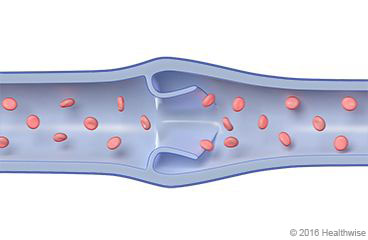
Overview
Immune thrombocytopenic purpura, or ITP, is a blood problem. It happens when your immune system does not work as it should and destroys platelets in your blood.
Platelets are a kind of cell in your blood. They have a sticky surface that helps them form clots to stop bleeding.
Your blood can't clot if you don't have enough platelets. This causes abnormal bleeding. Bleeding can get worse over time, or it can come on fast.
To treat ITP, you may need to take medicines to help stop the destruction of platelets. You may need platelets added to your blood. Or you may need surgery to remove your spleen. Your spleen's job is to remove platelets from your body. So taking out the spleen helps increase your platelet count.
Follow-up care is a key part of your treatment and safety. Be sure to make and go to all appointments, and call your doctor if you are having problems. It's also a good idea to know your test results and keep a list of the medicines you take.
How can you care for yourself at home?
- Be safe with medicines. Take your medicines exactly as prescribed. Call your doctor if you think you are having a problem with your medicine.
- Before you start any new medicine, tell your doctor if:
- You have had a bad reaction to any medicines in the past.
- You take other medicines, such as over-the-counter medicines, vitamins, or herbal supplements.
- You have other health problems.
- You are or could be pregnant.
- Do not take aspirin or other anti-inflammatory medicines (such as ibuprofen or naproxen) without first talking to your doctor. Ask your doctor if it is okay to use acetaminophen (Tylenol).
- Do not take two or more pain medicines at the same time unless the doctor told you to. Many pain medicines have acetaminophen, which is Tylenol. Too much acetaminophen (Tylenol) can be harmful.
- Get plenty of rest.
- Be careful not to hurt yourself. Avoid contact sports and activities that could cause you to fall and hit your head.
- Do not donate blood.
- Try not to use alcohol, marijuana, or other drugs. They increase your risk of serious injury.
When should you call for help?
Call 911 anytime you think you may need emergency care. For example, call if:
- You passed out (lost consciousness).
- You have signs of severe bleeding, which includes:
- You have a severe headache that is different from past headaches.
- You vomit blood or what looks like coffee grounds.
- Your stools are maroon or very bloody.
Call your doctor now or seek immediate medical care if:
- You are dizzy or lightheaded, or you feel like you may faint.
- You have abnormal bleeding, such as:
- A nosebleed that you can't easily stop. This means it's still bleeding after you have pinched the nose shut 2 times for 15 minutes each time (30 minutes total).
- Your stools are black and look like tar, or they have streaks of blood.
- You have blood in your urine.
- You have joint pain.
- You have bruises or blood spots under your skin.
Watch closely for changes in your health, and be sure to contact your doctor if:
- You do not get better as expected.
Current as of: October 25, 2024
Author: Ignite Healthwise, LLC Staff
Clinical Review Board
All Ignite Healthwise, LLC education is reviewed by a team that includes physicians, nurses, advanced practitioners, registered dieticians, and other healthcare professionals.

